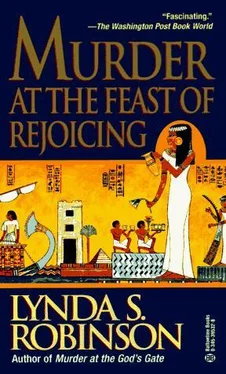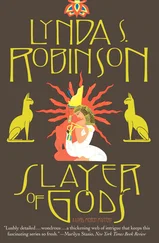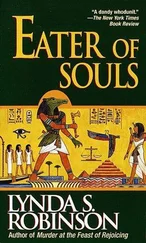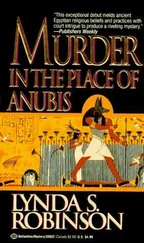Lynda Robinson - Murder at the Feast of Rejoicing
Здесь есть возможность читать онлайн «Lynda Robinson - Murder at the Feast of Rejoicing» весь текст электронной книги совершенно бесплатно (целиком полную версию без сокращений). В некоторых случаях можно слушать аудио, скачать через торрент в формате fb2 и присутствует краткое содержание. Жанр: Исторический детектив, на английском языке. Описание произведения, (предисловие) а так же отзывы посетителей доступны на портале библиотеки ЛибКат.
- Название:Murder at the Feast of Rejoicing
- Автор:
- Жанр:
- Год:неизвестен
- ISBN:нет данных
- Рейтинг книги:5 / 5. Голосов: 1
-
Избранное:Добавить в избранное
- Отзывы:
-
Ваша оценка:
- 100
- 1
- 2
- 3
- 4
- 5
Murder at the Feast of Rejoicing: краткое содержание, описание и аннотация
Предлагаем к чтению аннотацию, описание, краткое содержание или предисловие (зависит от того, что написал сам автор книги «Murder at the Feast of Rejoicing»). Если вы не нашли необходимую информацию о книге — напишите в комментариях, мы постараемся отыскать её.
Murder at the Feast of Rejoicing — читать онлайн бесплатно полную книгу (весь текст) целиком
Ниже представлен текст книги, разбитый по страницам. Система сохранения места последней прочитанной страницы, позволяет с удобством читать онлайн бесплатно книгу «Murder at the Feast of Rejoicing», без необходимости каждый раз заново искать на чём Вы остановились. Поставьте закладку, и сможете в любой момент перейти на страницу, на которой закончили чтение.
Интервал:
Закладка:
He and his brother hadn't fought as children. Ra had been too young, and once he was old enough, Meren had been sent to the royal court to be reared among princes and the children of high nobles. To Meren, Ra had been a babe, an endearing child in need of protection. But as the years passed Meren had grown more and more confused and angry at the difference in the way his father had treated them. For him there could be no mistakes, no gradual progress in learning. He was expected to learn the skills of a scribe or those of a soldier at once, with no help.
For Ra, life had been different. Ra was young, Meren was told. Ra hadn't been given the gift of as clever a heart as Meren's. Ra was unique, his parents had said; his talents had to be nurtured, encouraged, aided.
Once, long ago, before he'd been sent to the royal nursery, his father had given him his first bow. He had shown Meren how to string the tiny replica of a man's instrument-once. Meren tried to bend the bow as his father had. It snapped in his small hands. Meren was surprised and brokenhearted at the destruction of this prize of manhood, but his father had erupted in rage. He still remembered the bewildered shame he'd felt as Amosis bellowed at him in front of the household.
Years later Ra had broken his first bow, and his second, and had lost his third. Each loss had been met with tolerance. Ra was so strong. No wonder the bow broke. Ra was so busy and popular with his friends. It was understandable that a bow could be misplaced. There was always an excuse.
Now Ra lived on excuses, and Meren was afraid his brother would never understand that the world wouldn't conform itself to his desires. He was afraid that Ra had so misunderstood the world that he'd committed murder with the notion that there would be yet another convenient excuse to save him from the consequences.
"You sent for me, lord."
"What?" Meren dragged his gaze from the silver spray of light on the water. "Oh, Nebamun, yes. You've examined the querns and grindstones? What do you think?"
"Lord, anyone hit with a stone roller would be bloodied."
"I know that, but is there some other way to kill a person with it?"
"I know not, lord."
"And there's still no sign of any tekau poison about the estate?"
"No, lord. I think the evil one must have used it all in that jar of pomegranate wine." Nebamun cleared his throat. "You asked who might have knowledge of the use of the tekau plant, my lord. A physician would, for it can be used in small amounts to induce sleep or visions, or relieve pain, but it is a dangerous thing. Otherwise, perhaps someone who was interested in gardens and plants might know of it; a mistress of a household, for example."
"But there's none in this garden."
"No, lord."
"So someone brought it with him. You may go," Meren said as he rose and walked to the edge of the pool. Kneeling, he touched the petal of a rose lotus. A frog croaked and hopped into the water, splashing his hand.
"This is madness," he said to himself. "Stop worrying about Ra and think of what you've discovered."
Anhai. She had been killed some time on the night of the feast after Hepu began his Instruction, in some mysterious way, and then dumped into the granary. But putting her in the granary must have been an awkward business. Yet her clothing and wig had been neatly arranged. Why repair her appearance after she'd been killed?
"And there's that scrap of papyrus," he muttered.
Had the killer searched Anhai for a piece of papyrus and then rearranged her clothing? Since finding the scrap, he suspected it might have something to do with the woman's death, but a search of the house had yielded no papers that would have been worth a murder. Of course, the evil one might have destroyed it, or still be carrying it. Did he dare search his own family and Wah? He might have to. Still, he might be chasing a phantom. The scrap might mean nothing.
And who had reason to kill Anhai? Bentanta, and possibly Ra. Meren was skeptical that Antefoker or Wah would kill over debts, and he knew his sister wasn't a murderer. Besides, Ra and Bentanta had both been involved with Anhai, and both had been in a position to kill her the night of the feast.
What was worse, they also had a reason to kill Sennefer. Anhai might have shared her damaging knowledge of Bentanta with her husband, thus provoking Bentanta to kill him. Ra might have killed Sennefer out of jealousy over Anhai, or out of revenge if he suspected Sennefer of killing her.
Meren groaned and pressed his palms against his closed eyes. What a miserable choice of guilty ones. And Bentanta appeared the most likely, since it was her wine that killed Sennefer. But Ra could have stolen into the house from outside and poisoned it. So, too, could the other inhabitants of the house-Wah, Nebetta, and Hepu. His parents wouldn't have killed Sennefer, and Wah had no reason to do it.
"Damnation," Meren muttered. "I'm making no progress at all. I should have brought my juggling balls. Think, you fool. Go back to the beginning-no-to the feast."
He cast his thoughts back, trying to remember if anyone had acted strangely. Idut had dragged him to the reception room to greet the guests. Aunt Cherit had been annoyed with him for refusing to accede to the family's plans for his future. The Antefokers had arrived. Antefoker had been determined to corner Anhai about her cheating him in trade.
Then he remembered Sennefer coming in with Anhai and Bentanta. And at once husband and wife had begun slashing at each other with their tongues. Only Wah's appearance saved everyone from witnessing a fight. There had been talk of the days at Horizon of Aten when both Anhai and Wah had served Nefertiti. But Wah had made even discussion of the fabulous Nefertiti tedious.
Until Ra had arrived. Meren swerved away from considering the ugly reunion with his brother and the annoying discovery that Ra had linked himself with his cousin's wife. His next memory was of being cornered by Wah, succeeded by that quarrel between Bentanta and Anhai. Why hadn't Sennefer stopped it? He'd been nearby, reclining on a chair and footstool, touching his slightly melted unguent cone and sniffing his fingers. Yet he'd done nothing to stop his wife and her supposed friend from quarreling at so important a celebration as Meren's feast of rejoicing.
After the fight and his unsuccessful attempt to make Bentanta confide in him, Meren had been waylaid by Antefoker, then rescued by Kysen, only to be forced to listen to Hepu's Instruction. During this ordeal he remembered seeing Sennefer, Nebetta, Idut, and Wah, but not Ra or Bentanta. However, he'd been distracted by Isis's conversation with Ra's dissolute friends.
He leaned over the pool and spoke to the black reflection of his body. "It's no use. I see nothing that points the way. No signs of guilt, no marks or traces to lead me to the evil one."
And he was beginning to suspect Anhai had been killed by magic. How else could she have been dispatched without any trace of violence or poison? Yet a search of the house and grounds had revealed no signs of the use of magic-no replicas of Anhai, no collection of the dead woman's hair or nails, no evidence of ritual burning of sacrifices. However, if someone had performed magic while in the midst of some household ritual, at the shrine, for example, such behavior might go unnoticed.
No, that didn't make sense. If someone was using magic, he wouldn't need to dump Anhai in a granary. The magic could have been worked while the murderer was at the feast among those he could call upon as witnesses to his innocence.
Several loud cracks and a yelp, then another, interrupted his musings. The door to the garden banged opened, and Idut marched in, holding an ivory fan. Behind her the two men guarding his privacy bent over, one rubbing his head, the other his shin. Idut descended upon him, shaking the fan in his face.
Читать дальшеИнтервал:
Закладка:
Похожие книги на «Murder at the Feast of Rejoicing»
Представляем Вашему вниманию похожие книги на «Murder at the Feast of Rejoicing» списком для выбора. Мы отобрали схожую по названию и смыслу литературу в надежде предоставить читателям больше вариантов отыскать новые, интересные, ещё непрочитанные произведения.
Обсуждение, отзывы о книге «Murder at the Feast of Rejoicing» и просто собственные мнения читателей. Оставьте ваши комментарии, напишите, что Вы думаете о произведении, его смысле или главных героях. Укажите что конкретно понравилось, а что нет, и почему Вы так считаете.












